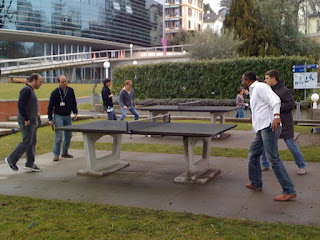After a hectic - but good - week with graduation ceremony, the big ball at the Palace Hotel, a few days of skiing in France with some of my classmates - or fellow alumni as I should call them now - we packed my apartment into the car over the weekend and went to my new home in Genova, Italy. My girlfriend moved from Copenhagen to Genova in July, so this is where the next chapter of our lives will be written.
For the past three months or so I have had one particular time and situation in mind. The time was Monday 14 December - i.e. yesterday - at around 8.15 in the morning when my girlfriend had just left the apartment to go to work. I pictured myself making a cup of fresh coffee and enjoying it on the balcony, while thinking about the past and future. I had been looking forward to that very moment with great anticipation and with some anxiety.
So yesterday that moment came. Susana went to work. I had already prepared the coffee. I put on a jacket - it is only 3C degrees here these days - and went to the balcony. The sun was just coming up and the view of the Mediterranean was stunning. And then I asked myself the question that I learned to ask myself this year: 'So, how do you feel, Thorsten?'.
'Well, I don't know', my first thought was, but as I have learned through the work with my PDI 'shrink', it will come out once I try to describe it. So how do I really feel?
Sad? - Not so much anymore, last week I did, sad to be leaving, sad to give up something unique and special that never would come back. Sad to say goodbye to a lot of really special friends. How can they be special if there are so many of them, you may ask. Well, they just can.
Regrets? - Not anymore, again, last week I did have a lot of regrets. Regrets that I did not get to talk much more to many more people in the class, that I did not go out more, that I did not work even harder, pushed myself further, read more cases, did more work in the groups, etc. I then realized that I gave what I had. Perhaps I could have made different choices which would have given different outcomes, perhaps, perhaps not, but I could not have done MORE.
Sense of achievement? - Not really, perhaps I should say not yet. Logically I should feel it. I have just completed the toughest year of my life, in many ways. I think the real value of what I learned only will show once I start putting it to use.
So what DO I feel?
I feel like in a vacuum, a bit of nothingness somehow, not positive, not negative, just being in this very moment without anything that I HAVE to do. A feeling that there is a world out there waiting for me. A feeling of being prepared to go and grab it, but also a feeling that it will not come to me. If I do nothing, nothing will happen. Most of all I feel an underlying confidence that I both can and will grab it. A confidence that I will figure out how.
While moving I came across an old Andrew Lloyd Webber CD that I used to play a lot, it must be at least 15 years old. As I am writing this Jason Donovan is singing 'Any dream will do'. I could not agree more.
It is time to hand over to the new 'generation' at IMD. Thank you to all the applicants, future students, classmates, partners, parents and everyone else that have bothered to read my scribbles this year and thank you for all the feedback and encouragement, particularly when times were tough. It was a pleasure and an honor to be your eyes and ears in the IMD MBA 2009 class room. :-)
Ciao!
Thorsten
 Well, perhaps there was some sense of achievement after all! :-)
Well, perhaps there was some sense of achievement after all! :-)
Genova from our balcony, the home of a new beginning.
Thank you for making this year such an unforgettable one!

















